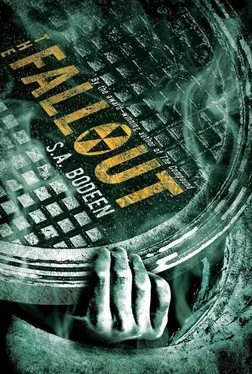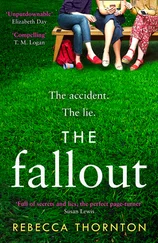“None taken.” He looked around at all the obvious security measures, then handed me a cell phone.
“What’s this?” I asked.
“Your mother asked me to give it to you. Untraceable. I’m number two on speed dial.”
I started to ask who was #1, then realized I didn’t need to. I turned the phone over and looked at the screen. My first cell phone.
Eddy had one already, of course. What teenager didn’t have a cell phone? He stayed in contact with his friends in Hawaii, I knew that. Sometimes it bugged me, and I’d thought about asking for a cell phone, but who was there for me to call?
Still, I felt a little thrill as I slipped it in the front pocket of my jeans.
“You’ve got an hour. Then I come looking for you.” He got back in the SUV and didn’t take his eyes off me.
I headed toward the front doors, which automatically swooshed opened before I got there, and I stepped inside. The floors and walls were white, and the place looked like a hospital. A short, stocky man with a graying, receding hairline came toward me. He wore a white lab jacket and black pants, and held out his hand. “I’m Dr. James Barkley.” He had a slight accent, which I couldn’t place.
I shook his hand. “Pleased to meet you. I’m—”
“EJ. Ms. Greene told me all about you. Perfect SAT scores at fifteen!”
What? Ms. Greene had certainly taken liberties with the truth in order to make me sound exceptional. I hadn’t even taken the SATs, and was fairly sure I wouldn’t get a perfect score when I did.
“Amazing.” He smiled.
“I guess so.” I hoped there wouldn’t be any more surprises courtesy of Ms. Greene.
“I’m so glad to have you here on behalf of YK.” He held out an arm. “This way, please.”
We walked down a brightly lit hallway filled with closed doors. It felt so familiar, so similar to the Compound that I shuddered slightly, and found myself relieved as I passed each door and found that none were painted yellow.
He stopped in front of one near the end of the hallway and opened it, then ushered me inside, where several people in white lab coats and plastic goggles stood over trays of test tubes. Some held eyedroppers and methodically added something to the test tubes. Others seemed to be recording data on laptops as the others worked.
Dr. Barkley spoke quietly. “This is one of our many labs. Research is where most of the funding goes.”
“You’re working on a cure then?” To complete the picture, I opened my journal and jotted something down.
He smiled. “That’s the main goal. But just isolating data related to aging and the disease… that can be a victory, too.” He lowered his voice even more. “Some years ago we had a fire that destroyed most of our research. We were so grateful to Mr. Yanakakis. He gave us enough funding to start over again. Although we’d lost so much, at least we were able to keep going.”
My face had gotten hot as he talked about my father. Was I so sensitive that I couldn’t stand to hear anyone speak about him?
No. I just couldn’t stand to hear anyone talk about him, as if he were anything but what he had been: a madman. The thought of even admitting to anyone that I was his son…
I turned back toward the door. “Is that it? Just research?” My tone must have been a bit brusque, because Dr. Barkley’s smile wavered. “I can show you our therapy section.”
I didn’t know what that was, but I nodded. I wanted to get out of that lab that reminded me so much of my father. And my former life.
He led me down a hallway and outside. We dodged raindrops as we walked across a cobblestone road to another building. After a short hallway, he opened a set of double doors and we entered a glass-domed room, so high over my head I couldn’t help but turn my focus upward. Plants were everywhere, and colorful butterflies flitted overhead. A large sparkling pool took up a major portion of the space, the rest of which was covered with grassy walkways and benches. “This is amazing.”
Dr. Barkley glanced at his watch. “Our first children should be arriving in a little while.”
“What is this place?” I asked.
Instead of answering, he motioned to a nearby cushioned bench. As soon as I sat down next to him, the phone in my pocket felt too bulky and uncomfortable, so I took it out and set it on the bench beside me.
He asked, “Do you know anything about progeria?”
I shrugged. “Just what I read in the prospectus.”
“Well, these kids aren’t going to recover. It’s not like other childhood afflictions that they have the hope of leaving behind them as they grow up.” He pulled out a YK tablet from the deep pocket of his lab coat and swiped a finger across it. “Do you mind?” he asked. “I find it much easier to make all this clear if I start from the beginning.”
“Not at all,” I said. “It’s a really fascinating disease.” I quickly backtracked. “I mean… not to make light of anything, I just—”
“I understand completely.” Dr. Barkley set a hand on my arm. “Progeria is fascinating . And mysterious. Which is why I’ve dedicated my life to it.” He held out his computer so I could see a photo of a newborn.
Dr. Barkley said, “Progeria is extremely rare, and only affects one in eight million newborns worldwide.” He pointed at the photo. “As newborns, children with progeria appear normal. But…” He tapped the screen and the photo switched to one of an older baby. “Within a year, their growth rate slows. Soon they are much shorter and weigh less than others their age.” Again he tapped, and the photo of a boy, maybe five or so, in a navy-blue sweat suit, appeared. He was bald, with a pinched nose and wrinkled skin that looked very aged. While his head looked very large, the face and jaw seemed very small, too small for the size of his head.
Dr. Barkley said, “These children are of normal intelligence, but their appearance is very distinct.”
I asked, “Are there other symptoms? Besides the ones you can see, I mean.”
He pointed at the picture. “They typically have symptoms that you would normally only see in much older people. Stiff joints, hip dislocations, cardiovascular disease.”
“Heart disease?” I asked. “Like heart attacks?”
He nodded. “Some children with progeria undergo coronary bypass surgery. But it’s just for more time, really. On average, most die around age thirteen. Usually from a heart attack or stroke.”
I looked away, at the glistening pool. I couldn’t imagine knowing you would die at such a young age. “And there’s nothing you can do?”
He motioned at the pool. “Hydrotherapy seems to help a little with the stiff joints, much like it helps senior citizens.”
It seemed so sad to me, that they couldn’t do more for the children. Or prevent it from happening in the first place. “Can’t they test for the disease?”
Dr. Barkley nodded. “Yes. But first let me explain how the disease works.” He swiped a finger across the computer screen, and a diagram popped up of the cross-section of a cell. “There’s a cellular protein known as Lamin A, which is encoded by the LMNA gene. Lamin A helps maintain the structure of the nucleus, which of course contains all the genetic information. Progerin is a mutated version of Lamin A, and it’s what causes progeria to occur.” He stopped for a moment and shook his head, as if in disbelief. “Twenty-five thousand base pairs of DNA make up the LMNA gene, but nearly all cases of progeria happen because of the substitution of just one base pair.”
I said, “So that’s why it’s so rare.”
He nodded. “The strange thing is, parents and siblings of children with progeria are almost never affected by the disease. Which means that the genetic mutation must occur just prior to conception.” He swiped across the screen until it was blank.
Читать дальше












